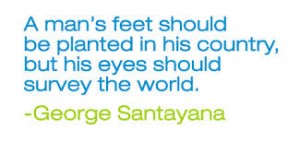Seeing as this is my first blog, I suppose I should start off with an introduction. My name is Sam Tuck, and I’m from East Vancouver, born and raised. This year I entered into the Arts faculty at UBC, specifically the CAP program Global Citizens. This is my second week here living on residence at UBC and I find it interesting the number of people I meet who are from different countries, cultures and communities than myself. The reason I mention this is because of the nature of the program that I am in. It is called Global Citizens for a reason; not only are we learning about what it means to be a global citizen, but as global citizens interacting through the program, we gain a greater understanding of each other and our individual situations that led us to where we are today. This week I’ve been thinking a lot about my own experiences that led me to choose UBC as well as this program. I think that others experiences, and learning about our “Global Citizen” community as a whole is very interesting as it pertains directly to the material we are dealing with in our classes, and helps us learn and discuss said material.
This brings me to ASTU, taught by our prof. Dr. Luger. I think it’s provocative that we started off the year with the article: The Role of Interpretive Communities in Remembering and Learning (Shazad 2011) because it brings up an interesting point that relates directly to the global citizens program. In her article, Shahzad focuses on not only how technologies of memory and individuals affect learning and memory (Sturken 2008) but also what she calls “interpretive communities” and how their “worldviews, historical experiences and frameworks of interpretation influence students memories and learning strategies and implications of their role for both teaching and learning.” (302, Shahzad 2011) We were discussing the essay and its methodology and importance in class, when I realized it was funny how we were discussing this topic in a sort of “global interpretive community” of our own. The class came up with some problems and questions we had about the essay and its implications, and I couldn’t help thinking that each one of us while reading it, had been shaped by their own interpretive communities and technologies. As Shahzad points out in her work “it (world-view) should be viewed as supplying a dynamic force of its own that fundamentally shapes interpretations of the knowledge”(312) Each one of us had a different perspective on the article and therefore is able to bring something new to the discussion in class. Expanding that to the community that we are developing in the CAP program as global citizens, I think that Shahzad would find studying how we learn in this program to be very thought provoking. The students in the program come from such a wide range of backgrounds that we each bring something unique to the table. Therefore we create an interpretive community of global citizens which in an environment of learning, enables the possibilities to be expanded greatly.
An example of the ability of this Global Citizens community to affect each other’s understanding of a subject was in my Political Science discussion group. We were talking about present day issues in the media, and someone presented on the topic of the beating of a black teenager by 9 police officers for jaywalking in Stockton, CA. The class began discussing the social and political implications of the incident itself, and there were a few students who were actually from the states. One of whom was from California and who provided some background as to the social make up of Stockton, as well as where its situated (in between Oakland and Fresno) which affects its social factors. With that information we were able to better understand the situation, as well as the general nature of the incident which led to further discussion. The fact that we are part of such a global program allows us to compare world views developed by our separate interpretive communities (Shahzad 2010) and to expand and greater understand the subject we are discussing.
For my personal story and how I got here, you could say that I was destined to be in some sort of Arts program/community my whole life. In elementary school I was enrolled in a fine arts school at Nootka elementary in Vancouver. From there I went on to a humanities mini school at Van Tech where we learned everything from Plato to Marx, and so now, not surprisingly I’m here. What is surprising to me, is who else is here with me. Every day I meet new people with different experiences, from different countries and it’s amazing to me that we all exist here in the same little patch of earth learning the same thing. I guess that’s what I was thinking about when discussing how the Shahzad essay relates to our course material, as well as our program. These “interpretive communities” remind me of sociology in the way that we are all connected and influenced by them, their interactions and how they have all led us here to create our own interpretive community of learning in this amazing university.
